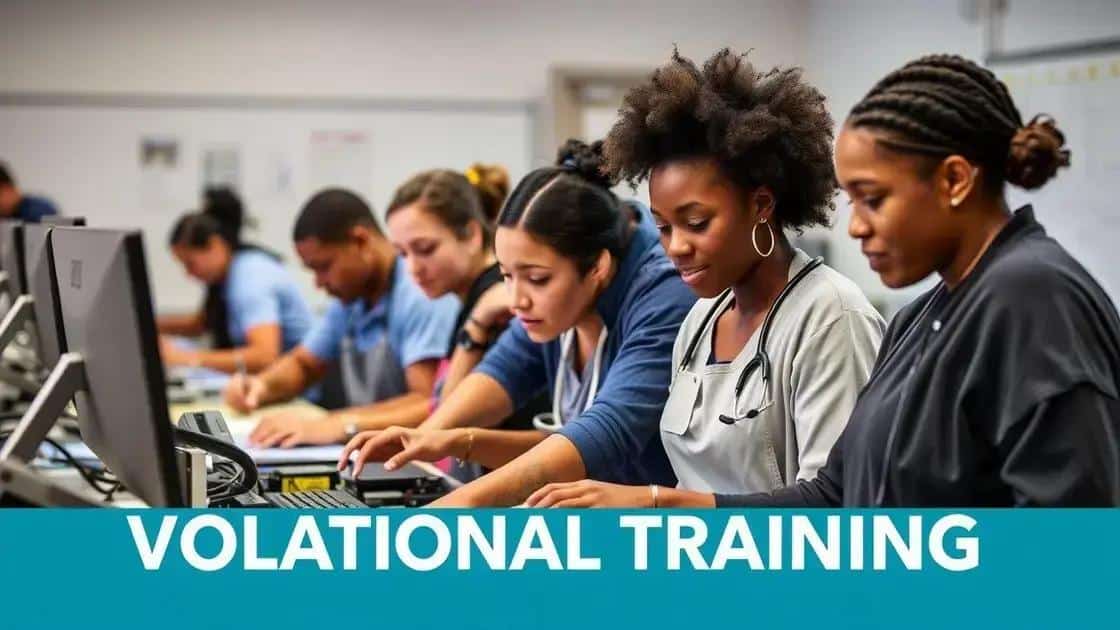Vocational training programs that lead to career success

Anúncios
Vocational training programs provide targeted skills and hands-on experience, leading to job readiness and successful career opportunities in various fields.
Vocational training programs offer a pathway to a rewarding career, equipping individuals with the hands-on skills needed in today’s workforce. Have you ever considered how such programs can transform your future? Let’s dive into their benefits and importance.
Anúncios
Understanding vocational training programs
Understanding vocational training programs is essential for anyone looking to shift their career path or enhance their skills. These programs offer practical training that focuses on specific trades or professions, helping learners become job-ready quickly.
When you think about vocational training, consider its key characteristics. Vocational programs often:
Anúncios
- Target specific job skills and trades.
- Incorporate hands-on, practical experience.
- Typically have shorter durations compared to traditional four-year degrees.
- Offer flexibility, often allowing part-time or evening classes.
In many cases, vocational training can lead to certifications that employers recognize. This recognition is crucial in fields such as healthcare, construction, and technology, where skilled workers are in high demand. Programs like these can open doors to new job opportunities and career advancements.
Types of vocational training programs
There are various types of vocational training programs available to suit different interests and skills. These programs include:
- Trade schools focusing on construction and maintenance skills.
- Technical institutes offering courses in IT and computer technology.
- Community colleges providing healthcare training.
- Apprenticeship programs that blend work experience with classroom learning.
Each program is designed to equip you with the necessary skills required in the workplace. For example, if you enroll in a culinary arts program, you’ll spend time in kitchens learning practical cooking techniques alongside theory related to food safety and management.
Vocational training programs also emphasize real-world applications. This approach ensures that what you learn in class is directly applicable in a job setting. In today’s competitive job market, having a skill set that aligns with employer needs can make a significant difference.
Benefits of vocational training for career growth

The benefits of vocational training for career growth are significant and can greatly influence your professional journey. These programs provide targeted skills and knowledge that align with industry demands, making graduates more attractive to employers.
One of the primary advantages of vocational training is that it often leads to faster employment opportunities. With practical experience learned in the classroom, students can enter the job market with confidence. Employers value candidates who possess hands-on training, as they tend to be more adaptable and job-ready.
Key advantages of vocational training
Some key benefits include:
- Specialized skills: Vocational training focuses on the skills necessary for specific careers, such as healthcare, technology, or trades.
- Shorter duration: Many vocational programs can be completed in a year or less, allowing you to enter the workforce quickly.
- Cost-effective: Compared to traditional degrees, vocational training often has lower tuition costs, making education accessible.
- Increased job security: With a skilled workforce, many industries seek trained professionals, which can lead to better job stability.
Furthermore, vocational training often includes internship opportunities, allowing students to gain real-world experience. This hands-on training can be crucial for building professional networks and gaining insights into potential employers. The connections made during internships frequently lead to job offers after graduation.
Vocational training programs also adapt to the evolving needs of the job market. As industries change, these programs update their curriculum to prepare students for emerging trends and technologies. This ensures that graduates have relevant skills that are in demand.
The supportive learning environment in vocational schools fosters collaboration, allowing students to learn from peers and instructors. This community can significantly enhance the learning experience and provide additional motivation to succeed.
How to choose the right vocational training program
Choosing the right vocational training program can greatly impact your career trajectory. With so many options available, it’s important to consider several key factors. Making an informed decision now can lead to better opportunities in the future.
First, assess your interests and career goals. What skills do you want to develop? Which industries attract you? Identifying your passion can help narrow down your choices. You should also think about the job market in your desired field, as this can show you where demand is highest.
Factors to consider
When selecting a vocational training program, keep these factors in mind:
- Accreditation: Ensure that the program is accredited and recognized by employers.
- Curriculum: Review the courses offered and make sure they align with your career objectives.
- Instructor qualifications: Check the experience and qualifications of the instructors teaching the courses.
- Job placement services: Look for programs that assist graduates in finding jobs after completion.
Beyond these factors, consider the format of the program. Some programs offer flexible schedules with part-time or online options. This flexibility can be beneficial if you are currently working or have other commitments. Engaging with alumni or current students can provide insights into the program’s strengths and weaknesses.
Another vital aspect is the location of the training facility. If possible, choose a program that is convenient to where you live or work. This can reduce commute times and make it easier to attend classes consistently. Additionally, consider the cost of the program. Look for financial aid options, scholarships, or payment plans to help manage expenses.
Finally, trust your instincts when making a decision. Researching and comparing various programs can guide you in the right direction, but your personal interests and needs should be the ultimate determinant. Remember, the right vocational training program can provide you with the skills needed for a fulfilling career.
Real-world success stories from vocational training graduates

Real-world success stories from vocational training graduates illustrate the transformative power of these programs. Many individuals have found fulfilling careers after completing their training, showcasing that vocational education can lead to real opportunities and job satisfaction.
For instance, consider Jane, who enrolled in a nursing program at her local technical school. After completing her studies, she quickly found a job at a nearby hospital. With her hands-on experience, she was able to provide quality patient care right from the start. Jane now enjoys a rewarding career and is pursuing further education to specialize even more.
Inspiring examples of vocational training success
There are numerous inspiring stories of graduates who have seen their lives change after completing vocational training:
- Mark: After attending a plumbing course, Mark launched his own business. He now employs several workers and provides essential services to his community.
- Emily: Following a culinary arts program, Emily opened her own restaurant. Her passion for cooking and customer service has made her restaurant a local favorite.
- David: David graduated from an automotive technology program and secured a well-paying job at a reputable car dealership, where he enjoys working on cutting-edge vehicles.
- Sarah: Sarah completed a graphic design course and started freelancing. Today, she works with various clients, turning her creativity into a rewarding career.
These stories show that vocational training isn’t just about acquiring skills. It’s also about building confidence and creating a foundation for a successful career. Many graduates express gratitude toward their instructors for their valuable mentorship and support.
Additionally, many vocational training programs offer networking events and opportunities for students to meet industry professionals. These connections can lead to internships or job placements. Graduates often point out that the relationships built during their training have been instrumental in their success.
People from all walks of life have been empowered through vocational training. With determination and the right skills, they demonstrate that career change is possible. The success stories of these graduates serve as motivation for those considering vocational paths.
Vocational training programs offer a path to successful careers for many individuals. By focusing on practical skills and real-world applications, these programs prepare students for demanding job markets. Success stories from graduates highlight how vocational training can change lives, providing opportunities and confidence in various industries. Whether you’re interested in healthcare, trade skills, or creative fields, there’s a vocational program that can help you achieve your dreams. With the right training, anyone can turn their passion into a profession and thrive in a fulfilling career.
FAQ – Frequently Asked Questions about Vocational Training Programs
What are vocational training programs?
Vocational training programs are educational courses focused on teaching specific skills and knowledge necessary for particular careers, preparing students for direct entry into the workforce.
How can vocational training benefit my career?
Vocational training can enhance your employability by providing hands-on experience and industry-specific skills that employers demand, leading to better job opportunities.
What types of careers can I pursue with vocational training?
Vocational training can prepare you for various careers, including healthcare, automotive technology, culinary arts, and skilled trades such as plumbing and carpentry.
How long do vocational training programs typically last?
Most vocational training programs can be completed in a year or less, allowing you to enter the workforce quickly compared to traditional degree programs.





